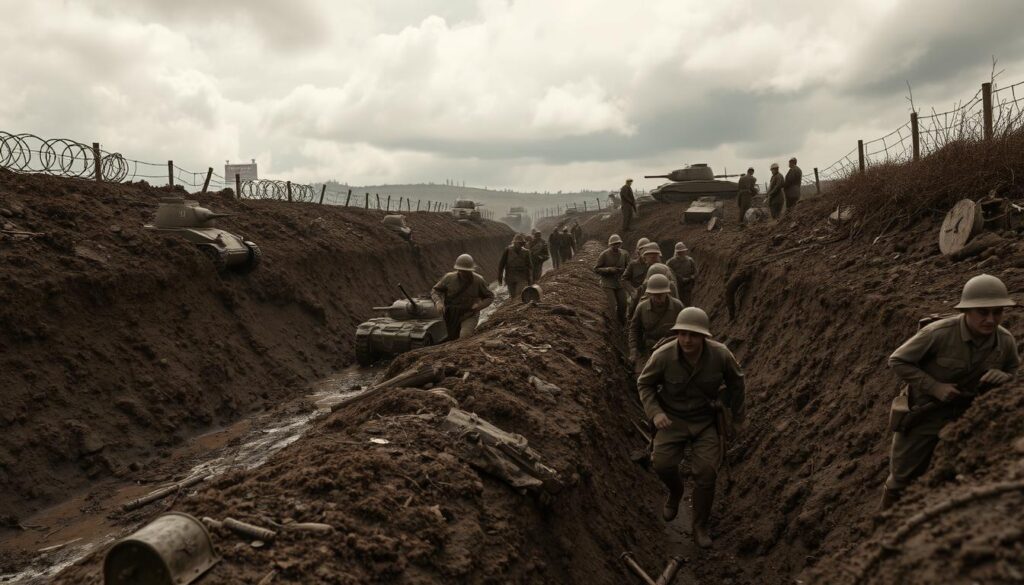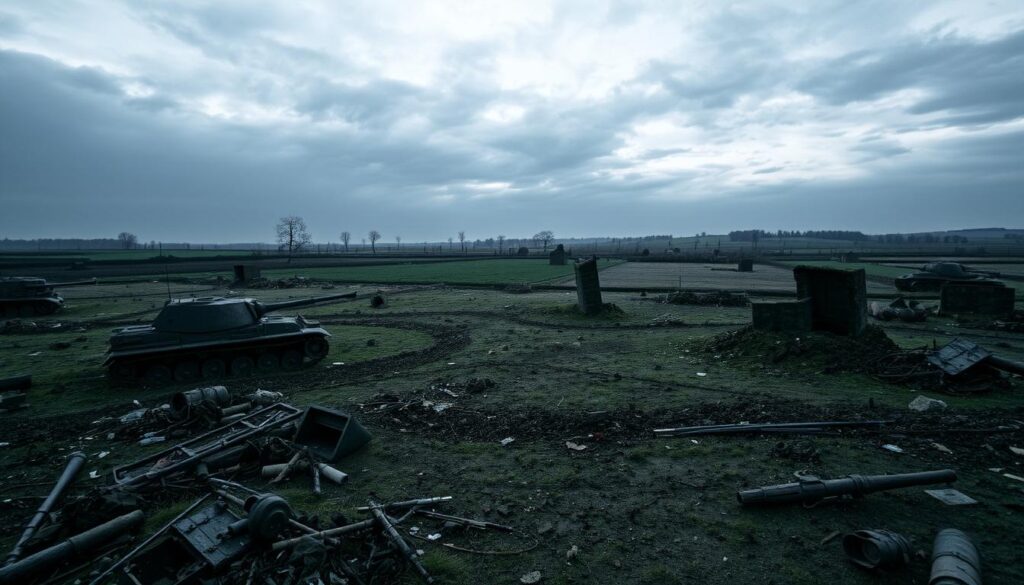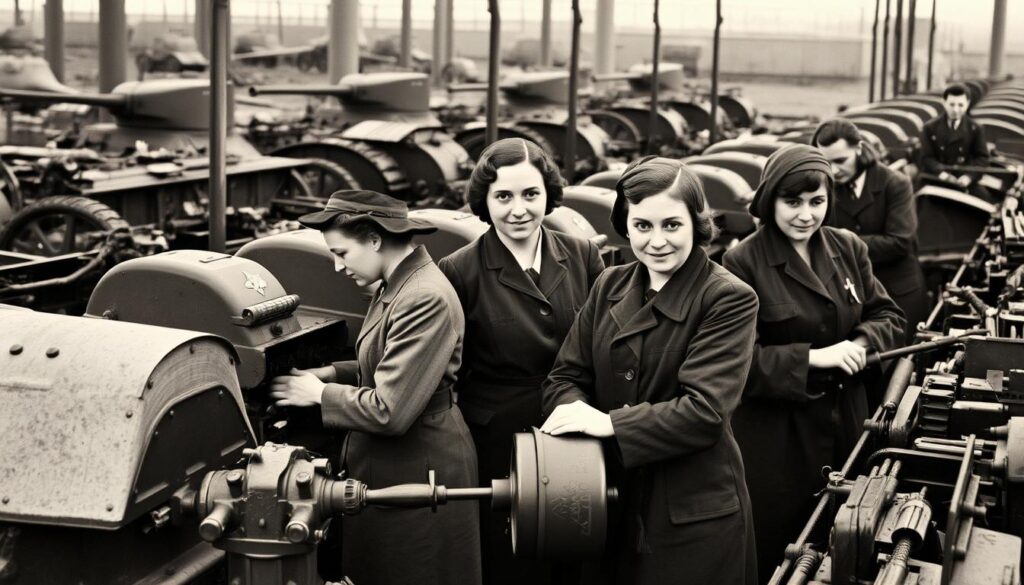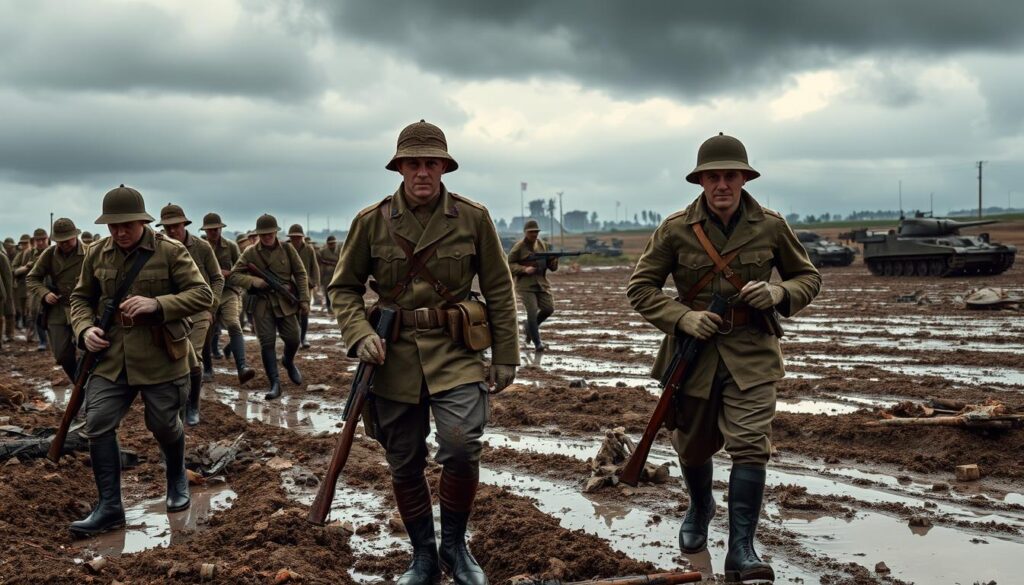France’s experience in World War I was deeply transformative. This story looks at how the French people bravely faced the Great War. It changed France forever, leaving a lasting mark on its people.
But what did France learn from its battles? How did the war affect its society and its future? These are important questions to explore.
Key Takeaways
- France’s pivotal role in World War I and the sacrifices made by its people
- The historical significance and lasting impact of France’s involvement in the Great War
- The evolution of French military strategy and tactics during the conflict
- The profound social and economic consequences of the war on French society
- France’s enduring legacy and commemoration of its World War I experience
France’s Role in World War I
France played a key role in World War I. It was one of the first countries to join the fight. The French military campaigns and battles on the Western Front, like Verdun and the Somme, were crucial. France’s efforts helped turn the war into a global conflict.
Historical Significance and Sacrifices
The French military faced huge challenges and losses during the war. Battles like Verdun and the Somme were especially hard. These western front battles cost France dearly, but they were key to the war’s outcome.
Catalyst for Global Conflict
France’s role in the war was vital. As part of the Allied forces, it helped make the conflict global. The French military campaigns on the Western Front, alongside their allies, shaped the war’s strategy. This made the war’s impact felt worldwide.
| Battle | Duration | French Casualties | Outcome |
|---|---|---|---|
| Battle of Verdun | February 21, 1916 – December 18, 1916 | Approximately 400,000 | French victory, but at a heavy cost |
| Battle of the Somme | July 1, 1916 – November 18, 1916 | Approximately 200,000 | Indecisive, but the French and British made some gains |
“The Battle of Verdun was a true ordeal for the French Army, which withstood the onslaught of the German offensive with admirable tenacity.”
Historical Context: Prelude to the Great War
To understand France’s key role in World War I history, we must look at the events leading up to it. The years before the war were filled with alliances, rising nationalism, and unease among central powers and allied powers in Europe.
The military history of that time saw two main alliances. The Triple Entente included France, Russia, and the United Kingdom. The Triple Alliance had Germany, Austria-Hungary, and Italy. These alliances, formed in the late 19th and early 20th centuries, helped spark the war.
- The desire for more land and power among the central powers, especially Germany and Austria-Hungary, added to the tension.
- The assassination of Archduke Franz Ferdinand of Austria in 1914 by a Serbian nationalist set off the events leading to World War I.
- The complex alliances and mobilization plans made things worse, pulling more countries into the war.
Knowing this history helps us see why France was so important in the Great War. It also shows how the war affected France and the world.
“The outbreak of the First World War was the culmination of a series of political, economic, and social tensions that had been building up in Europe for decades.”
Major Battles Involving France
France was key in many big battles on the Western Front in World War I. The Battle of Verdun and the Battle of the Somme were especially important. They showed the bravery, sacrifice, and smart tactics of the French military.
The Battle of Verdun
The Battle of Verdun lasted from February to December 1916. It was a long and hard fight that showed the worst of trench warfare. French troops, led by General Henri Pétain, fought hard to keep Verdun from the Germans.
Even though they lost many soldiers, the French won. They hurt the Germans a lot and stopped their attack.
The Battle of the Somme
The Battle of the Somme happened from July to November 1916. French troops fought alongside the British. They aimed to help Verdun and break through German lines.
The battle was very bloody for both sides. But it helped weaken the Germans and was part of their defeat on the Western Front.
| Battle | Date | Outcome |
|---|---|---|
| Battle of Verdun | February – December 1916 | French victory |
| Battle of the Somme | July – November 1916 | Inconclusive, with high casualties on both sides |
“The Battle of Verdun was one of the most brutal and devastating battles of the First World War. The French fought with unwavering courage and determination to defend their homeland.”
The French Military Strategy
The French military had a complex strategy for trench warfare in World War I. They used trench tactics to fight against their enemies. This was key to their success.
Trench Warfare Tactics
The French used trench tactics to defend and reduce losses. They built complex trenches, used barbed wire, and placed machine guns and artillery carefully. They also used sapping, mining, and flamethrowers to outmaneuver the enemy.
The French also created special assault troops called poilus. These troops were trained for close combat and used new weapons like grenades and mortars.
Leadership and Command Structure
The French military’s leadership was vital for their strategy. They had a skilled officer corps that planned and led operations. They also kept the troops disciplined and motivated.
Marshal Ferdinand Foch was a key leader. As the Supreme Allied Commander, he helped the Allies win the war. His strategic thinking was crucial.
| Trench Warfare Tactics | Leadership and Command Structure |
|---|---|
|
|

“The French army’s trench warfare tactics and command structure were crucial in their fight against the German forces on the Western Front.”
The Impact of War on French Society
World War I deeply affected French society, both at home and on the battlefield. The french home front saw a huge effort from civilians. Men and women worked together to support the war.
The homefront mobilization showed the French people’s strength and love for their country. Civilians helped in many ways, like working in factories, farms, and hospitals. They also kept their communities running smoothly. Their efforts were key to keeping the French war effort going and boosting morale.
The war also changed French culture. It made women take on new roles in society. The war brought the French people together, creating a sense of unity and pride.
| Cultural Impact | Wartime Civilian Efforts |
|---|---|
|
|
The war had a big impact on French society. It changed the culture, social roles, and economy. The homefront mobilization and cultural shifts showed the French people’s ability to adapt and overcome great challenges.
French Losses in World War I
France’s involvement in World War I was costly. The nation faced high casualty rates and a deep emotional and economic impact. The war left a lasting mark on French society.
Casualty Statistics
The French military lost a lot during the war. Over 1.3 million soldiers were killed. More than 4.2 million were wounded, and hundreds of thousands were missing or captured.
These numbers show how big the human loss was. It was a huge part of the French population.
Emotional and Economic Toll
The emotional impact was huge. Families were broken, communities were hit hard, and the nation was filled with grief. The economy suffered too.
Without so many men, France’s work and farming fell. The war cost a lot to keep going, affecting everyone.
“The true impact of the war cannot be measured in statistics alone. The emotional toll on the French people was immense, leaving scars that would take generations to heal.”
The war’s cost to France was huge. The nation had to deal with the lasting effects of its sacrifices. It was a hard time for France.

The Poilus: Stories of French Soldiers
The Poilus were at the heart of France’s World War I. These brave soldiers fought on the Western Front. They came from humble backgrounds but showed great courage and patriotism.
Their experiences in trench warfare were very hard. They faced enemy fire, disease, and the constant battle. But they never gave up, always ready to defend their nation.
“We are the children of France, and we will not abandon her.”
These soldiers made huge sacrifices. Many died, leaving families and communities in grief. Their bravery and selflessness remind us of war’s human cost.
But the Poilus did more than fight. They kept morale high and inspired the French people. Their courage and determination were key to the nation’s spirit.
Their stories give us a glimpse into World War I. They show the sacrifices, hardships, and victories of the French war effort. The Poilus’ legacy is a big part of France’s history in the war.
Women in France during World War I
The First World War changed the lives of French women a lot. They played key roles on the home front and even in the military. French women filled the gaps left by men who went to fight, helping a lot in the war.
Roles and Contributions
French women did many things during the war. Many worked in factories, making important military stuff. Others were nurses, helping soldiers who were hurt. Some even worked in jobs usually done by men, like driving and farming, as the country worked together.
- Worked in factories, producing military equipment and supplies
- Served as nurses, caring for wounded soldiers
- Took on roles in traditionally male-dominated fields like transportation and agriculture
Changing Social Dynamics
The war changed how French society worked. Women taking on new roles made them feel more independent and powerful. This changed old ideas about men and women, leading to more equality later on.
“The war gave women the chance to prove their worth and their abilities, and many seized that opportunity with enthusiasm.”
The homefront mobilization of French women helped the war effort. It also set the stage for big changes in social dynamics that would shape France’s future.

France’s Allies and Collaborations
France played a big role in World War I thanks to its teamwork with other Allied Powers. These included the United Kingdom, Russia, and the United States. Their alliances were key in shaping the war’s outcome.
Allied Powers Cooperation
France and its allies worked together closely. They coordinated their military plans and shared resources to fight the Central Powers. France’s leaders teamed up with theirs to make a strong war effort.
This meant sharing secrets, planning troop moves, and managing supplies. It helped the allied war effort a lot.
Wartime Alliances and Strategies
The wartime alliances were crucial for France and its allies. They helped come up with smart military strategies to beat the enemy. France and its friends used different tactics, like trench warfare and big attacks, to win on the battlefield.
Working together, they could use more resources and people. This made the allied war effort stronger.
France and its allies faced many challenges. But their hard work and teamwork helped them win. The wartime alliances and military strategies were very important for France during the Great War.
A Nation at War: France’s Journey through World War I
France’s journey through World War I was filled with sacrifice, resilience, and a lasting impact on its history and identity. As a nation at war, France was crucial in the global conflict. Its soldiers, known as poilus, left a mark of bravery and determination in history.
The legacy of WWI in France goes beyond the battlefield. The war changed France’s social, economic, and political landscape. From Verdun to the Somme, France showed its spirit in the face of adversity.
France’s alliances with other Allied Powers were key during the war. The country worked hard to coordinate strategies and win. The sacrifices of the French people, both on the front and at home, were huge. The war’s emotional and economic impact left a lasting mark.
Despite the challenges, France emerged from World War I as a resilient and determined nation. It played a key role in the postwar world and the 20th century. The war’s lessons and scars continue to shape France’s identity and global standing.
“The war has consumed us, but it has also transformed us. We shall emerge from this crucible, a nation forged in the fires of adversity.”
The Treaty of Versailles and Its Aftermath
The treaty of versailles in 1919 was a key moment after World War I. It had big effects on France and the world. The negotiations for the treaty were complex, with many interests at play.
Negotiations and Outcomes
The talks for the Treaty of Versailles were tough. France wanted to make Germany weak to avoid future wars. But, leaders like Woodrow Wilson of the U.S. pushed for peace.
The treaty was a middle ground. It had:
- Big losses and reparations for Germany
- The League of Nations, a start to the United Nations
- Rules on Germany’s military and the Rhineland
Long-term Consequences
The Treaty of Versailles had big, lasting effects. It tried to fix the war’s aftermath but caused anger in Germany. The economic and territorial losses led to more problems.
For France, the treaty was both a win and a challenge. It got some of what it wanted but faced ongoing European issues. These issues would shape France’s foreign policy for years.
France’s Legacy in World War I
The legacy of World War I in France is deep and lasting. It has shaped the nation’s history and its people’s feelings. The sacrifices made during the Great War have left a lasting impact.
France has many war memorials to honor those who died. Places like the Verdun Memorial and local monuments across the country remind us of the sacrifices made. These sites are a powerful reminder of France’s commitment to remembering its fallen.
The war’s legacy is also seen in France’s culture. Events like Armistice Day help the French people remember and learn from the war. These ceremonies are important for reflecting on the war’s impact on France’s identity.
The legacy of World War I in France is not just about loss. It’s also about courage, resilience, and remembering the past. France continues to deal with its wartime history. The legacy of the Great War remains a key part of France’s identity and its role in the world.
| Key Aspects of France’s World War I Legacy | Description |
|---|---|
| French War Memorials | Widespread network of monuments and sites that commemorate the sacrifices of French soldiers and civilians during the war. |
| Armistice Day Ceremonies | Annual events that allow the French people to reflect on the legacy of the war and honor those who lost their lives. |
| Enduring Impact on National Identity | The war’s influence on France’s cultural fabric, shaping the country’s collective memory and sense of national purpose. |
France is still dealing with the complex legacy of World War I. The nation remains committed to remembering the past and learning from it. The legacy of the Great War shows France’s strength and determination, forged in the fire of war.
Conclusion
France’s journey through World War I shows its strength, sacrifice, and lasting impact. The country was key in the war, with its military and people showing great courage. France’s role in the war had a deep effect on the world.
The lessons of World War I are still important today. They remind us of the sacrifices made and the need to overcome challenges. France’s military tactics, brave soldiers, and the roles of women during the war are all part of its rich history. As we remember the war’s centenary, France’s legacy in history is a source of deep thought and inspiration.
The Great War’s scars may never fully heal, but France’s spirit remains strong. This spirit of resilience and courage will guide France’s future. Looking back at its history, France is committed to honoring the past and working towards a better world.

